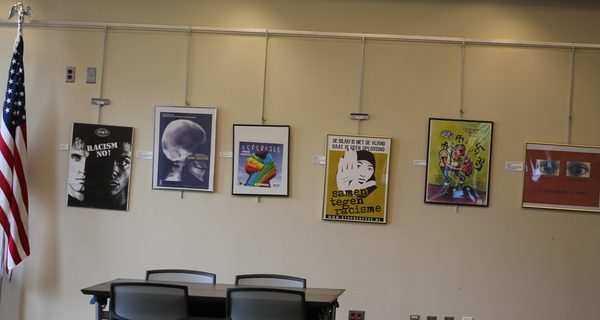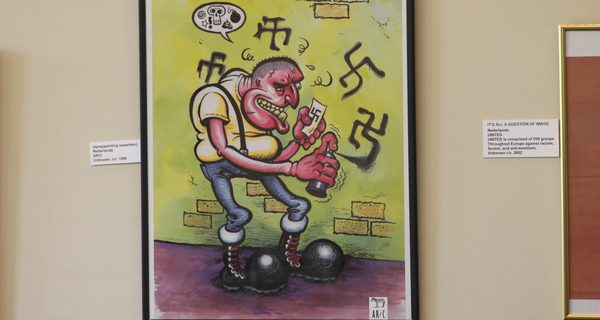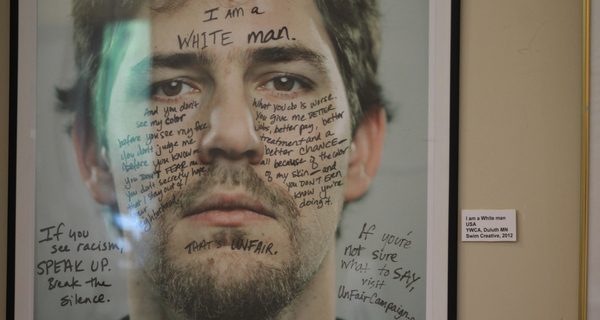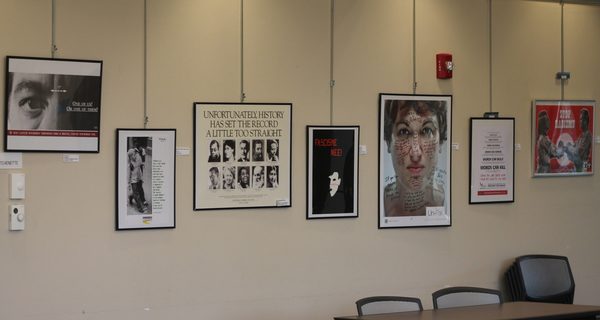From posters denouncing fascist ideologies, to ones pointing out the success of gay people throughout history, all the way to calling out white privilege and flipping the 'Cowboys and Indians' mystique on its head, the posters in Lewis’s exhibit were very different.
By James Kinneen
Hometown Weekly Reporter
Stephen Lewis has another poster exhibit up at the Walpole Library, with this one running until May 24. While Walpole library goers may remember Lewis' Cuban solidarity poster exhibit from January, this exhibit, featuring posters from locales as far-flung as The Netherlands and Slovakia, is all about diversity, with posters fighting against issues like racism, homophobia, Islamophobia, and other forms of prejudice.

Lewis started collecting posters about twenty years ago, when as an officer in his union, he went to conferences and would often take home some of the posters organizations would bring from their countries of origin. With so many sitting in his attic, he eventually decided to ask some of the unions in the United States for money to cheaply frame them and print out flyers for exhibition, then reached out to libraries to see if they would let him display the posters there. While some were initially hesitant, Lewis has exhibited in around seventy libraries across Massachusetts.
While some of the posters in the diversity-based exhibit originate from unions, as a flyer in front of the exhibit explains “the basis of success of working people is to stick together as a group, and not allow those differences to obscure their forces in achieving a better life for themselves,” others are from progressive organizations and progressives, political parties or groups that focus on that particular issue.
Lewis noted that he is not an artist, so he’s never made a poster in his tenure as a union officer, and that for whatever reason, while American unions support his work, unlike European unions, they tend not to make posters. Aside from that pragmatic issue, while having posters from different countries adds both an interesting variety and an international appeal to the exhibition, Lewis explained there’s another reason he displays posters from so many different countries.
“One of the things that I hope by having posters from different countries is that people can see some of the issues they’re dealing with exist in other places, and I hope create more of a solidarity between people of different countries.”

While Lewis has displayed many controversial posters based around hot-button issues like the Iraq War and nuclear disarmament, one would think anti-racism posters wouldn’t elicit much controversy. However, a pair of posters from Duluth, Minnesota, did just that. One features a white woman’s face covered in white privilege messages like “we’re lucky we don’t get followed by security when we go to the store,” “we’re lucky we don’t get stared at every single time we walk into a room,” “we’re lucky car doors don’t get locked when we walk by.” The other shows a white man with the following emblazoned on his face: “I am a white man. And you don’t see my color before you see my face. You don’t judge me before you know me. You don’t fear me and secretly hope that I stay out of your neighborhood. What you do is worse. You give me better pay, better treatment, and a better chance all because of the color of my skin, and you don’t even know you’re doing it.”
Lewis met the woman behind the images in Mexico, who explained they’d tried to make them billboards until they drew the ire of a famous, late talk radio host.

“I think those are just brilliant. And there’s actually a funny story behind those. I was on holiday in Mexico on the beach and got engaged in a conversation with a woman sitting nearby. It ended up she found out that I do these poster exhibits, and I found out she’s a graphic artist and that the organization she works with made these three posters to fight against racism. And she told me they also tried to do billboards, but Rush Limbaugh attacked them on the air and they had to deal with all this pressure to take the billboards down. But she mailed me these three posters when she got home, which I thought was great of her.”
While there's unfortunately never going to be a shortage of news clippings about racism, Lewis’ exhibit is also adorned with some news stories about issues like the doubling of white supremacist literature in 2019, the threat of white extremism, and German neofascist political parties winning local elections.
While racism is unfortunately not going away any time soon, Stephen Lewis' exhibit will run until May 24.






















